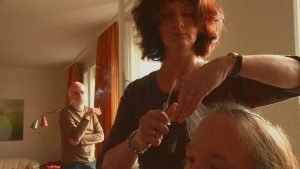Regie: Gabriele Mathes, AT 2015, DCP, Farbe, 16 min
 A break in filming: the protagonists are making small talk, children are playing, a pug is snorting. The director briefs the mother on the upcoming scene, but she refuses to be bound and gagged. She doesn't understand her daughter's anger, she complains. Whether it is the film character's or her relatives' remains unclear. Just as the rest of the plot resists a clear distinction between play and life. Much has never been properly expressed, it is said. In fact, repressed emotions seem to translate themselves into the film shoot with every glance and every gesture; into a flatness that increasingly suggests anxiety in the ruthlessness of the hand-held camera and natural light. A subtly constructed chamber play about (familial) speechlessness, childhood trauma and sadism.
A break in filming: the protagonists are making small talk, children are playing, a pug is snorting. The director briefs the mother on the upcoming scene, but she refuses to be bound and gagged. She doesn't understand her daughter's anger, she complains. Whether it is the film character's or her relatives' remains unclear. Just as the rest of the plot resists a clear distinction between play and life. Much has never been properly expressed, it is said. In fact, repressed emotions seem to translate themselves into the film shoot with every glance and every gesture; into a flatness that increasingly suggests anxiety in the ruthlessness of the hand-held camera and natural light. A subtly constructed chamber play about (familial) speechlessness, childhood trauma and sadism.
(Diagonale Text)
Feeling Doberman is a family horror film on thin ice: while director Gabriele Mathes stages a family in front of the camera, one wonders where the staging ends and the truth begins. Are these really her siblings, her mother, niece and nephew? Are the memories shared on camera real? The story of the starving pet, flat fur and milky eyes - just a script idea?
Szene 1, Wohnzimmer: Während die Regisseurin letzte Rollendetails mit den Protagonisten bespricht, wird die Mutter im Hintergrund geschminkt. Sie soll eine alte Frau spielen, die die Tochter zu Hause pflegt. Aber die kann – laut Drehbuch – selbst nicht mehr und wünscht der Hilfsbedürftigen den Tod. Oder, dass sie wenigstens ins Heim kommt. „Ich will doch net ins Heim“, protestiert die Mutter. „Aber im Film ist es halt so“, sagt die Regisseurin streng.
Szene 2: Im Vordergrund werfen die Kinder mit Lego, im Off hört man die alte Mutter schreien: „Au, auaua! I brauch a Hilfe!!“ Die Tochter schneidet weiter ungerührt Haare, ihr Mann raucht: „Soll I eini gehen?“ – „Na, lass´ a bissi schrein.“
It is an unspoken convention: families, children and old people are spared in mainstream cinema. Michael Haneke's Funny Games deliberately explodes its violence against a family into this safe assumption. Gabriele Mathes takes a side step. It's true that no one is physically harmed in the Doberman feeling. But just thinking about what it would be like to give free rein to their aggression, to bind and gag their mother so that she doesn't whinge in the bed over there, drives rage and terror into the faces of those involved. And they are undoubtedly genuine.
(Maya McKechneay)
A break in filming: the protagonists are making small talk, children are playing, a pug is snorting. The director briefs the mother on the upcoming scene, but she refuses to be bound and gagged. She doesn't understand her daughter's anger, she complains. Whether it is the film character's or her relatives' remains unclear. Just as the rest of the plot resists a clear distinction between play and life. Much has never been properly expressed, it is said. In fact, repressed emotions seem to translate themselves into the film shoot with every glance and every gesture; into a flatness that increasingly suggests anxiety in the ruthlessness of the hand-held camera and natural light. A subtly constructed chamber play about (familial) speechlessness, childhood trauma and sadism.
(Sebastian Höglinger, Diagonale-Katalog)
My mum refused. She doesn't want to be bound, gagged and suffocated. Not even for this film. During the break in filming, Erna and Helmut play a game from my childhood. There can be a murder pit in every heart.
(Gabriele Mathes)
In Gefühl Dobermann, Gabriele Mathes pursues a very unconventional approach to filmmaking: the family was involved in her shoot and learns about the story scene by scene. The fact that her own mother does not necessarily play a nursing case who is gagged in front of the camera is a dialogue in itself.
(Maria Motter, FM4)
Konzept & realisation: Gabriele Mathes
Kamera: Hermann Lewetz, Hanna Huber
Schnitt: Hermann Lewetz
Ton: Lisa Weber, David Lewetz
Musik: Claudia Martini, Klaus Kobald
Sounddesign: Gabriele Mathes
Darsteller/innen: Walter Mathes, Brigitte Schöllenberger, Maria Saturn, Josef Wimmer u. a.
Uraufführung: Diagonale 2015
Vertrieb: Sixpackfilm